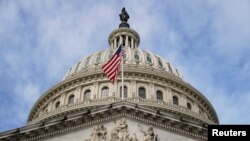The U.S. Senate voted 50-48 Thursday night to pass an agreement to extend the government’s borrowing authority through early December to avert what could have been the country’s first-ever default on its debts.
Senate Majority Leader Chuck Schumer announced the pact on the Senate floor after negotiations with Republican leader Mitch McConnell. He proposed to Democrats on Wednesday an extension of the country’s current long-term $28.4 trillion debt total by $480 billion to cover government spending into December, by which time the issue would again have to be addressed.
"Republicans played a dangerous and risky partisan game and I am glad that their brinksmanship did not work," Schumer said after the vote.
The bill now goes to the House of Representatives. Once it passes there, it goes to the president for his signature.
Congressional rancor over increasing the debt limit intensified in recent days, with the time counting down to Oct. 18, the date Treasury Secretary Janet Yellen says the government would run out of enough money to pay all its bills because it chronically spends more than it collects in taxes.
Monthly pension payments to older Americans, paychecks to government workers and payments to government contractors could have been delayed. But the biggest fear was that a default would roil the U.S. economy, the world’s largest, and send shockwaves throughout the global economy.
Republicans said they would not cast their votes to help Democrats raise the debt ceiling, in part to express their opposition to calls by President Joe Biden for more than $2 trillion in new spending to greatly expand the government’s social safety net programs. Democrats say the new spending would be fully paid for with higher taxes on corporations and wealthy individuals, which Republicans also oppose.
Default would risk millions of jobs
Senator Bernie Sanders, an independent who caucuses with the Democrats, welcomed McConnell’s move Wednesday to alleviate the debt ceiling stalemate.
The Republicans “have finally done the right thing and at least we now have another couple months in order to get a permanent solution,” Sanders said.
McConnell had said Democrats, who control the Senate, should use the reconciliation process to address the debt limit.
Reconciliation is a parliamentary maneuver that allows certain budget-related legislation to pass with a simple majority, not 60 votes, in the Senate. Under reconciliation, the Democrats would not need any Republican votes.
"This will moot Democrats' excuses about the time crunch they created and give the unified Democratic government more than enough time to pass standalone debt limit legislation through reconciliation," McConnell said. "Alternatively, if Democrats abandon their efforts to ram through another historically reckless taxing and spending spree that will hurt families and help China, a more traditional bipartisan governing conversation could be possible."
A default would risk millions of jobs and throw the United States into recession, “causing lasting harm to America’s economic strength by threatening the dollar’s status as the currency the world relies on and downgrading the U.S.’s credit rating,” the White House said.
Biden said raising the debt limit “is paying our old debts” and is not linked to his administration’s proposals for spending on infrastructure and social programs.
The U.S. is virtually alone among world governments in imposing a government borrowing limit, which it has increased numerous times over recent decades, either to a specific amount or suspended it for a year or two.
